#technically it's marshland
Explore tagged Tumblr posts
Text
You never feel how much of a swamp massachusetts truly is until summer hits
I'm fucking melting, this is a crime. I'm supposed to deal with this for my entire life???
5 notes
·
View notes
Text
thinking about no place... the thing about it is the name has to be a lie. like it just has to be wrong. and it already is canonically wrong. technically. cuz there was that little island sonic landed on initially. and that rocky outcropping with the paradox prism shard. but aside from that, the pirate ships couldn't exist if there was no land. because where the hell did the wood come from then?
#in my mind no place is MOSTLY water yes. but#there's also a lot of marshland and swamp. so low low low sea level places#where it's still TECHNICALLY water but#there's trees and other plants too#idk y scooby doo zombie island comes to mind but like. i'm sure there's at least one big haunted mansion somewhere in the middle of a bayou#and ofc there's caves and stuff too that poke out from above the water but then#descend into hellish underwater caves#and more rocky outcroppings too ofc...#and ice/glacial regions too. there's so much you can do with water tbh instead of just ''it's all ocean''
54 notes
·
View notes
Text
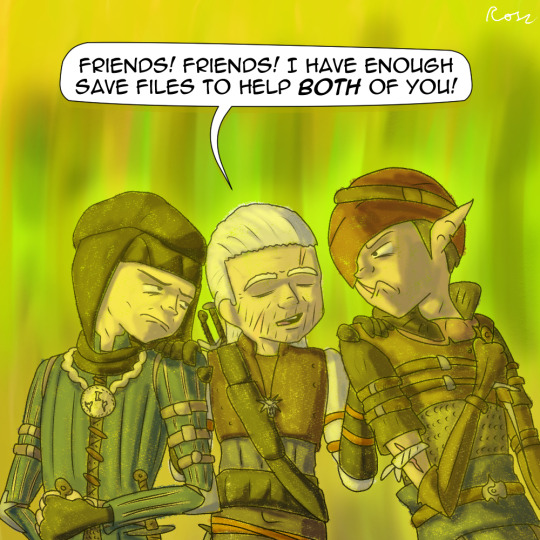
The Witcher 2: Assassins of Memory Storage.
In many ways The Witcher 2 is a quantum improvement over its predecessor - better graphics, better combat, better writing, better atmosphere, better art direction, better soundtrack, better characters - but it's still funny seeing the developers visually struggle with the hard limits of what PS360-era console hardware was capable of.
Lack of memory meant that all the fancy bells-and-whistles HD texture mapping could populate an area no larger and more complex than my back garden, which meant that despite the scope of the story being substantially greater than the first game, the actual physical size of the game world is massively smaller and less intricate, with working cities reduced to provincial villages and sprawling marshlands reduced to narrow loading-screen gulleys. You have to imagine this influenced the decision to introduce way more impactful branching paths with a totally different second half depending on your choice, described by many as effectively having two RPGs in one, but that seems less the intention and more that it was the only way to extract forty hours of content from the assets they were able to create.
I much prefer my RPG experiences to be one-and-dones, I don't do replays very often at all, but the straight shot to the end of this game was so brief that I feel I need the replay to get my money's worth out of it. But there's only so much I can complain when the story is so colossally better than CD Projekt Red's last go-round, like holy shit...
I was initially wary as I found the human/non-human conflict in the first game a bit contrived and this seemed to be treading similar ground at first (not to mention the Order was so obviously evil that you'd have to be psycho to take their side over the Scoia'tael), but it quickly becomes apparent that we're dealing with a distressed gaggle of bittereinders with no hope of victory being used as pawns in a larger game, as is their Blue Stripes counterparts hunting them to whom they're just one of a number of threats to their kingdom's security. Having an Evil Witcher as the antagonist deftly justifies Geralt's involvement in this situation involving kings, sorcerers and emperors that would normally be way above his paygrade.
Still, if there is one thing I feel the game jettisons from the books (and the first game was already hanging by a thread in this regard) is the sense that you're a glorified ratcatcher of no special importance, from jump you're immediately thrust into high-level political chicanery and the low-single-figure number of contracts you pick up in each hub are so perfunctory they may as well not be there. The elevation of book!Geralt from a passive POV to an active participant whose choices massively shape the world around him is even more pronounced in the second game than it already was in the first, in a way that makes the world feel smaller even though the cast of characters is vastly expanded and a lot more interesting.
Nuances in the dialogue, voice acting and motion performance completely absent from the first game are much more evident this time around, even in spite of the technical limitations that often lead to Triss's infamous dead-eyed stares. The only significant eurojank I encountered was an ongoing issue with accessing saves where the game would crash if I interacted with them for too long - the game is weird with saves in general, there's no way to have a dedicated "save file" and it doesn't delete old autosaves so I was constantly having to go in and delete old saves manually to avoid gumming up the hard drive. It's clear the developers really really want you to go back to earlier bits of the story and do them differently, and they built the system in such a way that makes sure you're always able to do that. Only issue is that I kinda do want to move onto the next game at some point, I hear vaguely down the grapevine that that's The Good One, but okay, I'll persevere here a little longer and see what I can make out of it.
38 notes
·
View notes
Text
So about the funny ‘translate the silt verses to Dutch post’
I’m thinking about how the Netherlands is literally what would happen if the trawler man got legalised in the long term. Because our country’s entire thing is being control freaks over water. We are technically in danger of flooding all the time but we don’t because of how much thought goes into our dams. We restrict the water, build on top of it. In every sense that’s such a unnatural concept. A country literally under sea level keeping itself dry by its own ingenuity.
If the Netherlands existed in the silt verses universe, how many sacrifices would go just to keep the water from not drowning all of us. Do you think we’d have sacrificed people to create Flevoland, so we have the power to build land on sea.
And like specifically Frisian’s just- work so wel with the whole silt verses fibe. ‘the name is derived from the verb fresare in Vulgar Latin, meaning 'milling, cutting, grooving, crushing, removing shells'; this name may have been given to the Frisii because they 'cut the land': digging ditches and dykes to irrigate the wet marshlands they lived at.’ (According to Wikipedia.) Like it is most definitely unintentional but I always see my own culture back in the silt verses. With the way so much of ours has been defined by our relation to water.
Uh conclusion I think Faulkner would hate the Dutch lol.
#this was me being a little self indulgent lol#frisians would’ve served the trawlerman me thinks#or atleast something similar#the silt verses#tsv#the trawlerman#parish of tide and flesh#the Netherlands#friesland#brother Faulkner
67 notes
·
View notes
Text
Introducing...


Small but deadly, graceful but calculated — known for their wits and grace, but above all, their pride. This bold clan occupies the southeastern marshland and are blessed with the extraordinary ability to breathe underwater with their gills.
With their cunning and clever nature, they have built up a reputation as one to be feared despite their smaller, more frail forms. Those who have faced a RainClan cat in combat can vividly recount the ruthlessness of their adversary, the dirty tactics they may have used, the cold look in their eyes. They are, after all, begrudgingly acknowledged as the most technically skilled of all fighters in the territories.
Life within RainClan
Strength is the most important thing for a RainClan cat; with their lithe, frail physicality and passive abilities that do not aid in combat, they make a conscious effort to stay on par with the rest of the clans. This sense of pride has perpetuated the clan dynamics, fuelling a culture of training and discipline. To be a member of RainClan is to embrace a lifestyle of constant improvement, where weakness is not tolerated and each cat strives to push their limits to new heights.
This culture has worked well for most members of the clan, who learn to excel and thrive under pressure, and build headstrong personalities that stand strong against outsider threats — it is said that RainClan is a clan without cowards. However, those who are unable to keep up often harbour feelings of self-doubt and insecurity. The prideful, judgemental attitudes of their clanmates are not at all helpful in supporting those who are less capable.
Due to having been attacked numerous times in history by their LucentClan neighbours, as well as being particularly vulnerable during leafbare when the marshes freeze over, they are meticulous about the security of their clan and are unforgiving to intruders. RainClan will take almost anything as a threat and train their apprentices to be prepared for anything.
#warrior cats#warriors oc#warriors oc webcomic#warriors designs#rainclan#clans#lore#refs#wc designs#wc
13 notes
·
View notes
Note
WAAAIT CAN YOU TELL US MORE ABOUT THE FANTRIBES they actually look SO sick and creative
Ok so this’ll be a big ramble since I’m on mobile and don’t have my pictures on me:
So this fantribe project has its own continent called Rupharis (because it sounded cool) and is actually I think the 3rd redesign of this project? By now the whole thing is like 4 or 5 years old. Rupharis is an arid themed continent but after the release of WoF’s 3rd arc I decided what if it’s another continent before the breath of evil took it over? (Fyi, I haven’t read past the poison jungle so I’m not rlly sure how this arc ends but whatever we ball)
So on the coasts and fringes of this continent is covered by thick jungles that the tribes are terrified of settling near (which is mostly urban legend among them as to why). Rupharis doesn’t have any animus magic or ties to the world beyond the continent so even if in a theoretical they exist in a modern time, they’d have no way of knowing the outside world existed unless a dragon were to come from the outside.
Ok so now about where the tribes live on this continent; Steelewings live in this huge canyon stretch near the continent’s major volcano and live off of mud beaches and in mud homes where the water is warm and they have direct access to lava as a resource. Lancewings live in a portion of the plains expanse where the trees grow exceptionally huge and live inside of the trees and around them I think. Lochwings live in a marshlands/everglades kind of place near the south and underwater in this huge expansive cave network formed naturally. Draftwings (which to the person who asked if they were arboreal, in the past they were!) live in this huge canyon stretch where colossal trees once stood, living in the walls of the canyon and in these now dead trees. Lastly, the Stampwings are nomadic largely due to a conflict resulting in the tribe separating into different clans. They still do technically have territories that a portion of the clans settle in but most form caravans large in scale and travel just to explore, forming temporary camps.
Ok so now something I think I should say is obviously this mysterious arid continent is strange and peculiar because wdym colossal trees?? Well.. this is kinda-ish where the breath of evil comes into play. I never explicitly stated how it got there or if it’s always been there but the continent has remains of gigantic tree stumps and roots that of course dragons happily make into homes. Also said above, lancewing territory has baobabs which are already big but can you imagine these trees large enough to house a few dragons? Yeah. It’s a weird situation but past me really went ham so you know.
I said it before but I don’t think I’ll bring back this project entirely but there’s a reason I did post about it to you guys,,, I got reminded about it and wouldn’t mind redesigning the tribes a little,,
7 notes
·
View notes
Text
Italian fascism was trying to defeat a nature [...] by declaring it a priority to civilize the marshes of the Pontine Plain. [...] The swampland was still the habitat of the anopheles mosquito and the dominion of the “Goddess of Fever.” [...] [A] flaw of a primal [...] nature, [...] unproductive [...]. The efforts to create “an idyllic rural area consonant with fascist ideals of productivity [...] within the state’s interests” included extensive electrification of the region, constructing thousands of kilometres of roads and canals and “large pumping and drainage plants called impianti idrovori (drainage pumping stations), in Italian literally ‘water-eating’ machinery plants,” founding an anti-malaria institute, having war veterans plant the region with water-absorbing [non-native] eucalyptus trees (these plants performed their job too well, which is why they were later torn out again at great expense [...]), stocking fish [...], establishing an anti-mosquito militia, and putting up children’s camps whose buildings were wrapped in ten layers of wire to protect them from mosquitoes. “The fascist emphasis on the technical and technological aspects of the land reclamation programme were also characteristic of a positivistic view of [technology and institutionalized knowledge] [...] aimed at controlling, rationalizing and ultimately creating an imperium over a previously unknown or ‘untamed’ area.”
Text by: Fahim Amir. “Cloudy Swords.” e-flux Journal Issue #115. February 2021. [Bold emphasis added by me.]
---
On 24 December 1928 Italy’s fascist regime launched [...] a fourteen-year national land reclamation programme aimed at [...] Italy’s ‘death inducing’ swamps [...]. The Pontine Marshes, a marshland spreading across 75,000 hectares south of Rome was given top priority [...]. [T]he fascist regime used an extensive propaganda machinery to promote the programme [...] as a heroic quest [...]. Newsreels documented step by step the struggle [...], with Mussolini himself often featuring, overseeing the project, or even working the land. [...] This policy [...] aimed [...] [at] improving [...] existing cities by removing “unhealthy” urban areas, through the process of sventramento (disembowelment). [...] Indeed, the project exhibits many similarities in aims and scope to a number of modernising plans that were materialised across the world at around the same time: the Tuscan maremma (1928), a large scale coastal reclamation project; the Zuiderzee dyke project in Holland (1920-1932), which produced the Ijsselmeer, an enclosed area of water that would later host urban settlements [...]; Spain’s ambitious national hydrological plan that would “correct hydrologically the national geographical problem” by introducing a system of dams [...]; Switzerland’s Linth valley hydro engineering scheme that drained marshland and provided the geographical basis for a unified [nationalist] Swiss identity [...]; Greece’s Marathon dam project, that would produce Athens as a western sanitized metropolis [...]. All of these projects shared [...] the desire to link these socially constructed techno-natures to a broader project of promoting national unity and [nationalist] identity.
Text by: Federico Caprotti and Maria Kaika. “Producing the ideal fascist landscape: nature, materiality and the cinematic representation of land reclamation in the Pontine Marshes.” Social & Cultural Geography Volume 9. 2008. [Bold emphasis added by me.]
138 notes
·
View notes
Text
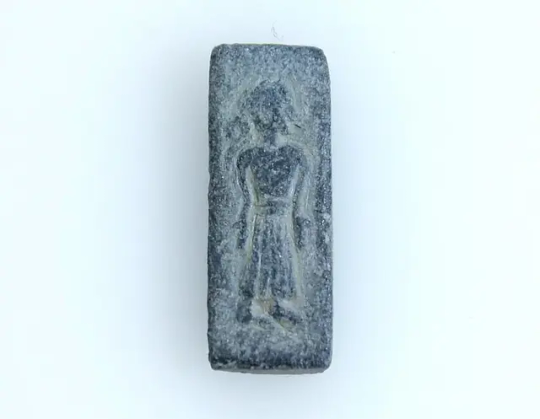
Rare Ancient Stamps Found in Denmark
In the center of Falster, southeast of Denmark, a man with a metal detector has made an important discovery. The discovery is so important that it could help write a few chapters for Danish history or at least the local history of Falster.
While Lennart Larsen was out on a rainy day and searching for anything of historical value, he suddenly heard a faint beep in his equipment, and when he checked the ground, he discovered small, interesting objects, unlike anything he had seen before.
A faint beep has indeed revealed a special stamp in the ground – a so-called Patrice – that was used to make gold images, which are believed to be gifted to the gods.
The Museum Lolland-Falster has been informed. The only two-centimeter-long object in Falster’s soil may be a trace of a former royal power on Falster, the museum said.
“This indicates that we are standing in a place that has meant some trade and probably also had some form of cultic activity. And although it’s a bit wild to say, it could also indicate that it was once a center of power on Falster,” museum inspector and archaeologist Marie Brinch from the Lolland-Falster Museum said.
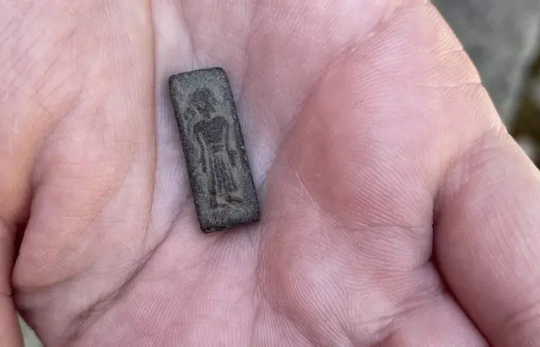
She emphasizes that the discovery was made in an area with names dating back to the Viking Age or even earlier and that the marshland was discovered in an area that had been sacrificed to the gods in the century preceding the stamp’s creation.
Archaeologists have before come across several signs of activity from the Iron Age and the Viking Age have been found, including an enormous shipyard and a large castle from the Viking Age at Falster. However, only a small number of discoveries have been made that can demonstrate where the island’s wealthy elite resided in the years prior to the beginning of the Viking Age. The new find may help to shed light on that.
Researchers have determined the tiny objects are stamps from the era just before the Viking Age. They were created between the years 500 and 700.
According to Margrethe Watt of the National Museum, who collects and researches ancient gold coins and stamps, these are extremely rare. There have only been 28 stamps discovered in the entire Nordic region, including the one from Falster, and it is a very unique stamp. South of the Baltic Sea, no stamps or gold coins have been discovered.
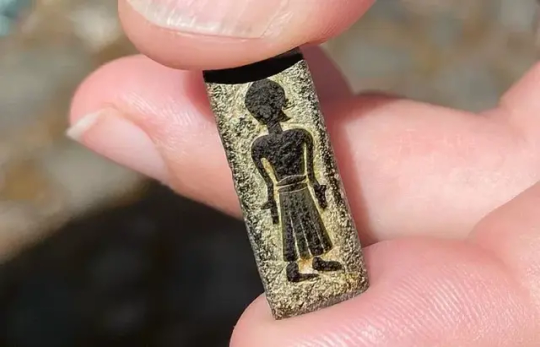
“The stamps are all very special. We only find them in the most important places of residence – those that we call the central places in the technical language. These are the places that we associate with the greatest magnates or kings. That’s the league we’re in here. And this stamp is at the same time very much for itself in its style,” she says.
“On the stamp from Falster, you can see a person in fine clothes, standing with their hands at a very special angle. The hands are down, and the palms are visible. It is something that we know in both Christian and pre-Christian cultures as either a sign of submission or a revelation. It is also a symbol that we see in many churches today, Watt explains.
Neither the god nor the king were shown as weak or flawed in any way. And you don’t see that on the stamp from Falster either. “This means that it is either a royal figure who submits to a god – or that it is a god who reveals himself to a human being,” she says.
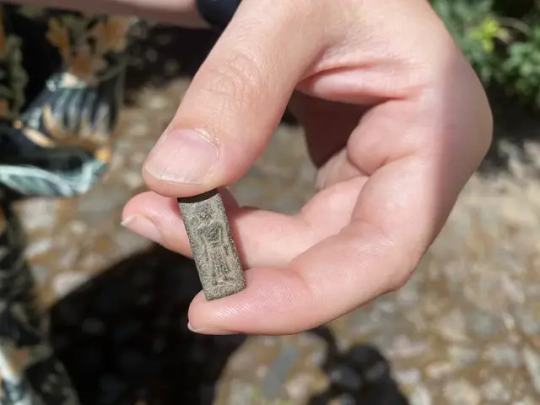
“It is actually difficult to see if it is a man or a woman who is depicted. You would see that by the fact that there is a tuft of hair on the back of the piston. But it may well appear that there is, she says, and emphasizes that it requires further investigations to determine whether this is the case.
As there may be more finds in the ground at the site, Museum Lolland-Falster does not yet want to publish where the find was made – but states that it was made in central Falster.
By Leman Altuntaş.
#Rare Ancient Stamps Found in Denmark#Falster Denmark#patrice stamp#ancient artifacts#archeology#archeolgst#history#history news#ancient history#ancient culture#ancient civilizations#Iron Age#viking age
56 notes
·
View notes
Text
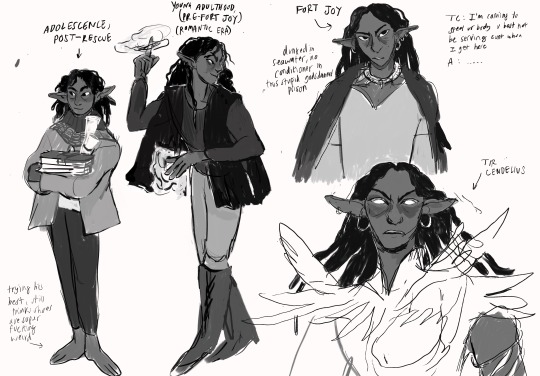
i finally finished dos2.... thoughts ft. drawings + choice playthrough phone notes (spoilers obv)
my godwoken was an elf witch named allegory. he ended up as a necromancer/hydrosophist combo. blood damage + healing was a fun mix! odd contrasts <3
his backstory, 2 me, is that he was lost in a marshland as a little kid, and tir-cendelius saw the chance to keep him isolated (seeing off any potential rescuers, magically expanding the marshes every time he tried to trek out and leading him in circles) + raise the perfect tiny loyal godwoken for when The Time was Right. he let him out when he was an elf teen. t-c should have kept him longer because if anything it just made him weirder when he got reintegrated into society a couple decades later. F
what if your god grew you in a petri dish to [major game spoilers, redacted]. but you were a capricious little know it all with a jester's soul. what then

gorry took sebille, fane and ifan with him because i thought he would assemble a team of hot emos if given chance. this paid off + i love them all dearly
i wasn't expecting the origin characters i didn't take with me after act 1 to UP AND DIE. but it actually added a really good set of stakes. responsibility for ur actions. lohse yelled at me for leaving her to her fate and i felt SO bad. sorry miss thing
LOVED the worldbuilding....i was super familiar with 5e before i played bg3 so i sort of knew what was coming most of the time but for divinity i had to LEARN. super fun. 100% recommend
also i thought bg3 went in on the body horror but divinity was Something Else.

^ and then larian said okay that was fun what if we do it again. and made bg3. anyway
i was hideously bad at combat for ages until i listened to all the people on reddit chanting 'put points in warfare' and then it was much much much more doable lol
ngl i actually very much prefer dos2 to bg3. i loved loved loved bg3 but after like 4 playthroughs during various patch stages it was such a relief to play a game that's actually completed and won't eat my laptop for breakfast!!! first two bg3 files i had i couldn't make it to the lower city because the optimization on mac was so diabolical that it wouldn't actually play until after patch 5. dos2 lets me also have photoshop on my computer. and files that aren't bg related. miraculous
but even ignoring technical issues: from a story and world standpoint dos2 felt way more expansive and inventive. campy but also harrowing in a way that bg3 just didn't hit for me. i also genuinely enjoy being given a zillion pieces of almost overwhelming info and then sorting it out so i am biased. may expand on this at a later point and not under a mile long read more. moving on
romanced fane bc i loved his voice acting and i thought the culturally cannibalistic elf/the one guy with no flesh to eat bit was funny. jokes on me i fell in DEEP. u canonically have disappointing sex because hes simply made of bones without nerves and afterwards he takes notes. he calls u dear heart offhandedly in act 1 like it's nothing then goes right back to being aloof. how many more times does he have to tell you? he has business in the blackpits. he spends the whole game having an increasingly worse time. he's a loser. it's all his fault. he got me. he got me good. god damn
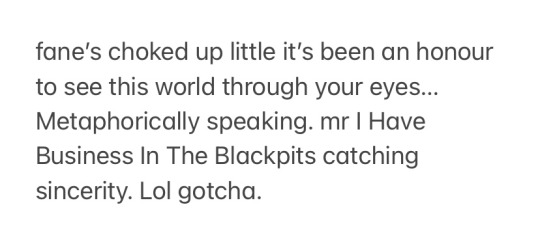
my game glitched (?) and even tho he rejected sebille (sorry baby) her and allegory still made out right before the big final choice. no option not to. then he had the expected epilogue with fane. poly ending canon enough for me!
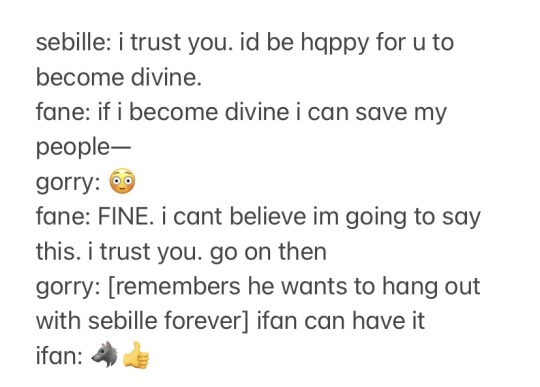
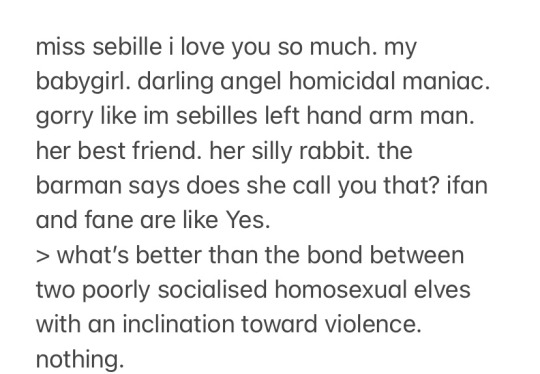
also the music was bonkers good and the audio direction in that one battle in the final act? mwah. and dallis' va knocked it out of the entire park.
last thing here's a gorry i drew when i was still back in act 1. 180 hours ago. titled on my phone as 'praying at every altar so i always come out on top'
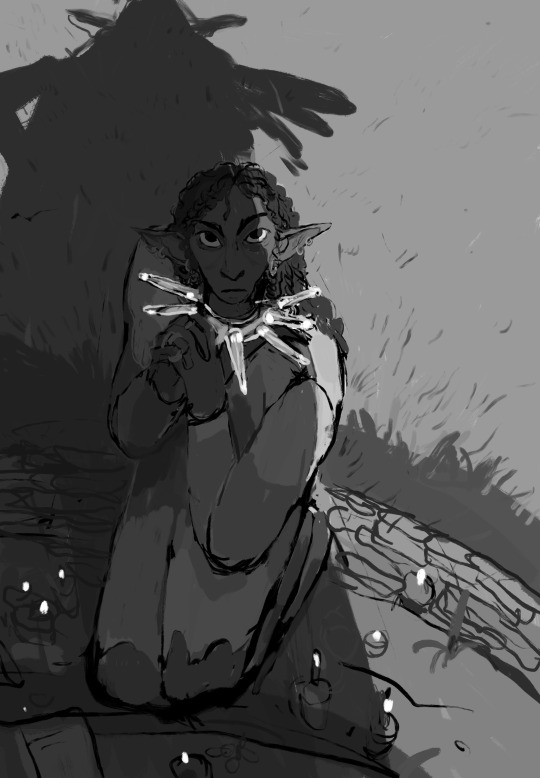
anyway if u made it this far: thank u. go get divinity: original sin 2 when it's next on sale. wise wise wise choice of £6.99 <3
#dosblogging#im an incurable fandom lurker so i rly dont know how to post. so heres a bunch of things all crammed together. tl;dr I LOVED DOS2!!#my art
13 notes
·
View notes
Text

The American novelist John Barth, who has died aged 93, was a noted evangelist for experimental fiction, beguiling his readers with complex stories within stories.
He claimed as his patron saint Scheherazade in the Arabian Nights, the vizier’s daughter whose tales, spun out for 1,001 nights, entranced King Shahryar: “The whole frame of these thousand nights and a night,” Barth said, “speaks to my heart, directly and intimately – and in many ways at once personal and technical.”
He came to notice with his third novel, The Sot-Weed Factor (1960), a riotous mock-epic pastiche that drew upon a satire of American manners of the same title published in 1708 by one Ebenezer Cooke.
Reviewers compared the book to Henry Fielding’s Tom Jones, and enjoyed Barth’s rollicking use of coincidence, parody, farce, sentimentality and melodrama. It was much-hyped – “One of the greatest works of fiction of our time,” said the writer and artist Richard Kostelanetz – but Gore Vidal found Barth’s humour to be laboured: “I could not so much as summon up a smile at the lazy jokes and the horrendous pastiche of what Barth takes to be 18th-century English.” Other critics complained of its excessive length, narrow emotional range and an underlying facetiousness in Barth’s tone.
His next novel, Giles Goat-Boy (1966), brought Barth critical and commercial success. It was a mythology drenched campus novel, complete with cold war allegories and self-reflexive narratives, 766 pages long. Barth’s penchant for addressing political, religious and philosophical issues gave his novel a flavour of seriousness that was widely praised. Vidal, however, called it “a book to be taught rather than read”.
The following year, Barth published The Literature of Exhaustion, a manifesto for literary postmodernism, in the Atlantic magazine. The traditional forms of representation were used up, he argued. There were too many contemporary writers who went about their business as though James Joyce, Franz Kafka, Jorge Luis Borges, Samuel Beckett and Vladimir Nabokov had never written. Barth’s impatience with most fiction and his eloquent enthusiasm for the experimental caught a moment in contemporary culture. He became the poster boy for postmodernism.
One of the three children of Georgia (nee Simmons) and John Barth, who ran a sweet shop, he was born in Cambridge, a small crab and oyster town in Maryland, and grew up amid the flat, low-lying tidal marshlands on the eastern shore of the Chesapeake Bay.
His twin sister was whimsically named Jill, and Barth’s family knew him as Jack, a source of teasing during their schooldays.
After graduating from high school, Barth enrolled in a summer programme at the Juilliard School of Music in New York. An enthusiastic jazz drummer, he hoped for a career as an arranger, but at the Juilliard he encountered some seriously talented performers and his ambitions shrank.
Instead, he enrolled at Johns Hopkins University, Baltimore, to study journalism. He remained at Hopkins to complete a master’s degree, and in 1953 landed a job in the English department at Pennsylvania State University, where he remained for 12 years.
Barth’s first published novel, The Floating Opera (1956), was a traditional first-person narrative about boozing, desire and nihilism on the eastern shore of the Chesapeake. The End of the Road (1958), described by the critic Leslie Fiedler as an example of “provincial American existentialism”, was a darker novel about a grad-school dropout, ending with an abortion. Some of the more gruesome details were cut at the insistence of his publishers, but restored when the novel was later reissued.
In 1965 he took a job teaching at the Buffalo campus of the State University of New York, where he remained until 1973. During that time of student unrest, the campus was repeatedly occupied by local police and troopers of the National Guard. Barth was less sympathetic to the protesters than some of his colleagues, but he wholeheartedly threw himself into the trashing of the practitioners of “traditional” fiction such as John Updike and William Styron, whose work he felt was a literary dead end.
Under the growing influence of Borges and 60s counterculture, Barth turned away from fat pastiche-novels to short fictional forms. Lost in the Funhouse (1968) was a melange of short fictions for print, tape and live voice, which he staged on campuses across the nation. In 1973 he returned to Johns Hopkins to take up a chair of creative writing, and stayed until retirement in 1992.
By the 80s, the frisky, postmodern self-consciousness that had made readers sit up in the 60s had lost some of its capacity to shock. It had gone, within a generation, from being a great cause to a routine, a shtick. Barth’s books increasingly needed to be explained to readers, and sales fell away. Complex, self-referential novels such as Chimera, which shared the National Book Award in 1973, the epistolary Letters (1979) and Sabbatical (1982) were seen as working out the implications of The Literature of Exhaustion.
In 1980 he revisited this essay with The Literature of Replenishment, in which he repented his youthful scorn for the 19th-century novel as practised by the “great premodernists” such as Dickens, Twain and Tolstoy. If, as the modernists asserted, linearity, rationality and consciousness are not the whole story, argued Barth, “we may appreciate that the contraries of those things are not the whole story either … A worthy program for postmodernist fiction, I believe, is the synthesis … of these modes of writing.”
Barth’s essays were collected in three volumes as The Friday Book (1984), Further Fridays (1995) and Final Fridays (2012). A further collection of short nonfiction pieces, Postscripts, was published in 2022. Once Upon a Time (1994), with its teasing promise of tall tales, was his most autobiographical novel. Coming Soon!!! (2001), with its references to The Floating Opera, showed that the old postmodernist playfulness was unquenched.
In 1998, Barth won both the Lannan Foundation’s lifetime achievement award and the Pen/Malamud award for excellence in the short story.
He married Anne Strickland in 1950 and they had three children, Christine, John and Daniel. The couple divorced in 1969 and the following year he married Shelly Rosenberg. She and his children survive him.
🔔 John Simmons Barth, writer, born 27 May 1930; died 2 April 2024
Daily inspiration. Discover more photos at Just for Books…?
6 notes
·
View notes
Text
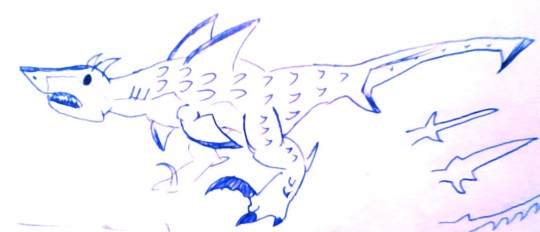
Another old sketch I wanted to share. As you might imagine, this piscine wyvern is a mix between dromaeosaurs and thresher sharks. - HYBORLEX Title - Sharpfin wyvern Monster class - Piscine wyvern Known locales - Coastlines, marshlands, estuaries Element/ailment - Bleed Elemental weakness - Ice (3), Dragon (3), Water (2), Fire (1), Thunder (1) Ailment weakness - Poison (3), Sleep (3), Blast (2), Paralysis (1), Stun (1) Hyborlex is a piscine wyvern that stalks environments supplemented by water, ranging from coastlines to estuaries. Recognised by their jagged bluish-grey scales and sharp fins, Hyborlex is distinct from most piscine wyverns in that their physiology resembles theropod bird wyverns. Powerful hindlegs equipped with curved claws make Hyborlex a superb runner and jumper. Its fins, scales, teeth and long tail are exceptionally sharp, perfect for inflicting gouging wounds. Unlike most piscine wyverns, adult Hyborlex cannot swim. Infants are reared in water, but will adapt to a terrestrial life upon reaching the juvenile stage. Hyborlex is an adaptable and intelligent carnivore that sees most anything as potential prey. Its speed and tenacity claims a wide variety of small monsters, ranging from young carapaceons to wingdrakes, and even larger monsters may be brought down by precise strikes to induce blood loss. Though not necessarily gluttunous or aggressive, Hyborlex will gladly take any opportunity to feed, only dissuaded if it feels the situation is not to its advantage. Humans are counted in the long list of creatures Hyborlex will hunt, thus field workers must exercise extreme caution that they are not caught off-guard by one of these opportunistic predators. Hyborlex's offensive strategy is simple; it relies on the jagged scales lining its body as well as its claws and teeth to inflict deep wounds on other creatures. It is a cunning monster that uses hit-and-run tactics to outmatch otherwise larger and stronger monsters. Its most effective weapon is its long tail. Usually used for balance, the extended fin is as sharp as any other protrusion and can be used like a bladed whip. Interestingly, Hyborlex have a tendency to pair up with another of their kind, forming a duo that patrols a particular territory. These pairs are usually mates or siblings, but occasionally unrelated individuals will work together. Hyborlex are extremely effective at hunting as a pair, typically employing the tactic of one occupying a target whilst the other prepares an attack from behind. Independant Hyborlex are rare, usually a younger or older individual made to occupy less productive territory. Technically Hyborlex is among the lower ranked monsters (Low Rank - 2, High/Master Rank - 2) but nonetheless hunters are advised to exercise caution when tracking these cunning predators. A single Hyborlex can be a dangerous adversary with its speed and jagged scales, and a pair of them is a daunting challenge even for experienced hunters. Quest receptionists must be absolutely sure that a Hyborlex is operating independantly before allowing lower ranked hunters to take the quest. Hyborlex is an effective predator, though it is still prey for larger carnivores. Hyborlex predominantly fears the fanged wyvern Torrenial, a formidable ambush predator of coastal and estuarine environments, and it is believed the preference for working in pairs is as much for protection as for hunting success. - Thank you for reading and take care.
10 notes
·
View notes
Text

The sortie had been simple, the mission quick and brutal, in and out, another insurgent dead and another checkmark on a quarterly earnings report. And it had been, the vanguard had cleared, the Omni-hackers deafened the comms, and the artillery had cut them down in droves. She had dropped 6 units herself, and in the process? Overtaxed the left flight thruster, burning out the internals. It was too dangerous to fly, technically possible and reckless to try.
Cherry Soda was not reckless. She abhorred risk, it's the reason she still fights for SSC in the first place. What would she do if they cut her off? How would she get food, shelter, her meds? If the one thing she's good for is piloting she is gonna do it, no matter what it takes.
So she won't be leaving SSC, and she won't be flying on a damaged thruster. Instead, she has a 2 day trek across the marshland to get to the rendezvous, where the nearest repair bay specialized for mech deployment can patch up her wing and get her flying again.
Maybe she'll work on music when she's home.
10 notes
·
View notes
Note
idk if you've elaborated on this in any capacity but what do bastien and wolfgang's living quarters look like before shit hits the fan and all that? does bastien share a lot of space with matteo at their house and do they have a separate sort of living quarters at the clinic? does wolf have a place they return to and can call some sort of home? if that makes sense. don't feel like you gotta like. draw up floor plans or anything for this i'm just curious as to what sort of spaces they consider home/their own and how that reflects aspects of their characters hehe
hiiiii thats a tasty question and funny you should mention drawing up floor plans because thats exactly what i started doing in the sims 4 as building blocks for my next comic- (specifically i started putting together the clinic since the scene takes place there. genuinely recommend this method its so easy for getting some background shots)
for Bastien indeed he lives with Matteo! they moved in with him pretty quickly since Matteo insisted on taking care of him and helping him sort of get on his feet before he could find a job etc after dropping out of med school. the apartment is Matteo's, or i guess more technically it belongs to his mother but either way its his familys money paying for everything. he never quite made the space for Bastien there and Bastien never felt like he was allowed to change anything to his liking, always feeling more like a guest there. so after a while the shine of the comfort and luxury wore off and it started to feel more like a cage, and Bastien would find more and more reasons to not spend much time at this house, some nights even preferring to just sleep in his truck. eventually they fixed up the floor above the clinic a bit - dragged in a mattress, got the water running etc so when he stays in there really late they can just crawl upstairs to catch some sleep inbetween shifts rather than drive all the way to Matteo's place. it's kind of a mess of a room but somehow he sleeps much more comfortably there than anywhere else.
Wolfgang's living situation is,,, in simplest terms they're squatting in an abandoned building, not far from a sort of android commune (for other androids who were forced out of the system or chose to leave it, since they have to still get energy and parts from somewhere its a sort of collective effort) (it's a neighborhood that the cops / authorities are pretty much aware of but usually leave alone with the occasional raid for good measure). they tend to stay out long stretches of time inbetween recharging and on their free time they like to crash at other people's places a lot, but when they need to be alone and uniterrupted this is where they go. it's not quite a home but its a clean little place, they keep a few potted plants and of course their wardrobe and notes on their investigations etc there. one benefit of the place is a lovely roof view of an overgrown marshland :) severe drawback is a kind of busted shower with only cold water but well its enough to wash off the blood !
#answered#thank you for asking!!#genuinely about a month ago i started detailing the room over the clinic where bastien sleeps sometimes hfhdfk#ramble#bastien#wolfgang
2 notes
·
View notes
Text
The Skunk Ape
“And we’re here.” My coworker Tyson said, as he stopped his truck in a flat, grassy area near the marsh.
We had a three day weekend thanks to Memorial Day, and I was spending it hunting with a pair of coworkers, Mike and Tyson. Truth be told, I didn’t like these guys very much, never did. But, they invited me out with them, and I figured it would be better than a normal three day weekend at home, just streaming TV with my girlfriend.
She almost didn’t let me go. I love her, but she is crazy (or at least back then, I thought she was); she believed some local news story she saw on TV about some rednecks who said that this huge, apelike monster, one that smelled as rancid as a dumpster, killed their dog. Personally, I thought it was just a bunch of bullshit. There’s no way a monster was really out there, less than an hour outside the city, right?
________
We planned to camp out in an area that technically wasn’t a legal hunting ground, but Tyson had been hunting hogs in this area for years, he knew this was the spot to get started. Besides, legal or not, feral hogs are a nuisance; I figured we were doing the land a favor by getting rid of one, (or a few, if we were lucky).
“Alright guys, we’re already a little behind thanks to last minute stop for drinks, so let’s hurry up, we gotta get this tent pitched while it’s still daylight before we start hunting”
“Start hunting?” I asked. “Aren’t we going to wait until the morning?”
Mike and Tyson both laughed. “Sorry, I just forget you’re a newbie sometimes. Best time to hunt hogs is at night; the little bastards are virtually nocturnal. So come on, let’s stop wasting time and get this tent setup, otherwise we’ll be doing it in the dark.”
As we were getting our tent and our firepit setup, I heard a strange howl coming from the marsh. Sounds like a bizarre mix between a chimpanzee screech and a lion’s roar.
“What do you think that was?” I asked.
“I don’t know, probably a horny buck.” Mike said, although it was obvious he was only guessing.
____
By the time the sun went down, our tent was pitched, and our firepit was assembled. We then loaded our rifles, and went hunting for wild pork chops.
About an hour or so into our hunt, I began to smell something foul; imagine raw sewage mixed with rotting meat, that’s how overpoweringly awful the smell was. I thought for sure it must have been a rotting carcass somewhere, but the smell almost seemed to follow us, as we were walking through the marshland.
I then heard a noise; it sounded like something rustling through the nearby bushes. I turned my flashlight in its direction, only to see nothing. I then heard a similar sound, this time coming from behind us. Immediately after, Mike screamed “HELP!”
He was dragged behind a tree. I ran over to try to help, and then, I saw the monster that I was warned about. Standing right in front of me, and right on top of Mike, was a monstrous ape. It stood at least seven feet tall, and had layers of brown, matted hair. Its odor was so abhorrent that it made my eyes water just standing within like, ten feet of it.
I looked down, hoping Mike was alive. But no, his head was bleeding profusely, and he wasn’t moving. Once the monster was sure he finished him off, he then started staring me dead in the eye.
I was sure I was about to be its next victim, before Tyson took a shot at the beast. The beast then retreated into the marsh, and we lost it as it entered the brush.
“MIKE! MIKE, SPEAK TO ME!” Tyson said, but it was too late.
“Come on.” he then said to me. “We have to get back to camp.”
_____
We walked back to our campsite in a hurry. I was hoping that the monster was dead, but had no way to know for sure. We kept our heads on a swivel, aiming our guns in the direction of every sound we heard, hoping it wouldn’t be the beast again.
I remember getting closer to the campsite, thinking Tyson’s bullet had either killed or scared off the ape. But then, I smelled something; a smell so awful, I instantly knew what it had to be.
“Tyson, it’s…” I began to say, before the beast rushed out from the the brush, and before either of us could aim and shoot, he plowed into Tyson like a football player. He knocked him down, and then pounded on his face with his ungodly large fists before finishing off by biting him in the neck. I turned and started running. I had to get away, but the beast wasn’t letting me go so easily.
I could hear it running after me, and quickly. After a long sprint, I decided to take my last stand. If I was about to die, I was at least going to try to take the monster with me. So I stood still, took a deep breath, aimed in the direction of the monster’s noise, and fired one shot.
I didn’t think it would work. I expected to miss, and for the skunk ape to then jump out and kill me. I went over to look for its body; I didn’t find it, but I found a trail of blood leading away. After a minute or so, I couldn’t smell its awful stench anymore.
_________
To this day, I’ve never been back hunting in that marsh.
#short fiction#original fiction#short story#original story#original work#horror#horror fiction#short horror story#short horror#cryptid#skunk ape#marsh
0 notes
Text
UT - A Splint for the Splintered
Summary: Grillby and Alphys, representatives of the starship Determination, bring peace offerings to a planet ravaged by war.
A/N: Written for the @au-roulette 2024. The AU I've been assigned is Space Exploration!
Grillby had seen many planets and species in his time—at their lowest lows, face to face on a slew of battlefields during the War of Worlds, and now finally on an upward trajectory ever since joining the crew of the U.S.S. Determination. His mere presence here as a culinary specialist was what the humans called an “olive branch”, a gesture that they were willing to work closely with Pyrovite and other affected worlds to rebuild what the war had broken.
The majority of the Determination crew was human, of course (such was the right of the victors, to outnumber the conquered) but the sparse number of alien faces Grillby greeted in the mess hall were tinged with a sense of relief. Even if they weren’t equals, even if they were swept off on away missions any chance the humans got to keep them out of sight and mind, they were technically instruments of progress, of peace.
Maybe that idea had made it easier to get comfortable, complacent and put the ugliest memories of the fallout behind them. It wasn’t so easy now with the ruins of Scelta looming on the shuttle view screens. Grillby had always been the quiet sort but staring at this tragedy, he couldn’t have found the words even if he wanted to. The scientific advisor, Alphys, swallowed with audible difficulty in the seat beside him.
“I-I knew it was bad…really, really bad but…he didn’t say it was…” She trailed off, claws tightening against the armrests.
Alphys and Grillby had only ever met one Sceltan over the course of the war, a former scientist who had mentioned The Great Breaking of his planet with stiff, cool, clinical detachment in his voice. Clearly he had a knack for understatement.
It was a pale, hollow half of a world, crippled, cavernous, its remaining plates precariously splinted in an artificial gravity ring—the humans’ work, a bargaining chip in exchange for a share of Scelta’s precious few remaining resources.
It wasn’t fair of them to ask. It wasn’t even kind, knowing the Sceltans literally had so little ground upon which to refuse, but the trade could only go through if the refugees inhabitants survived long enough to sign it. For that they would need rations, medical supplies; as part of today’s away team, that was Grillby and Alphys’ job.
Nothing but a bitter, biting wind was there to greet them when they stepped onto the planet’s cracked crust. Grillby had to duck briefly back into the mouth of the shuttle as his flame whipped and crackled defensively against the chill, while Alphys’ shiver was due more to her nerves.
“Okay, well, um…if this is the place, we better start unloading the supplies. So let’s…do that. I h-hope someone knows they have to come and pick them up…”
Unloading everything wasn’t as easy as they had hoped. Beyond the relative sturdiness of their designated landing site, the ground was even more fragile than first glances would have them believe, buckling underneath the cargo’s weight. Back and forth, here and there, to and fro they had to relocate each shipment and find the perfect balancing act until they could be sure it wouldn’t sink into the soft, sponge-like tissues beneath the surface.
“T-These pockets of s-sediment reminds me a little of the marshlands on Quatali,” Alphys remarked somewhere amidst her stream of chatter to fill Grillby’s apparently awkward silence. “Oh, you weren’t part of first contact on Quatali, were you? That’s where the team met Undyne. The Quatali p-people call her The Lady of the Lower Lakes; she was their sort of legendary hero, a guardian of the water, so when the team t-tried to collect samples, h-hoo boy, she was as mad as a—aahh!”
Grillby whirled around just in time to see her lunge back, foot twisting into one of the surface pockets as her tail lashed for balance and scattered a pile of ration packs in every direction. Abandoning his stack of boxes, Grillby was quick to maneuver her back onto stable ground. As soon as she was upright, she clutched at her chest, letting out a quick, chittering squeal in her home tongue before stuttering to return to Common.
“Oh, wow! Sorry, sorry about that but t-that really startled me!”
Grillby followed her gaze and found that just as he had a securing hold on his teammate, there was a small Sceltan boy with tense, protective arms wrapped around another taller one who, unlike Alphys, was already squirming to be set loose. Once he was back on his feet, he rattled various bones emphatically at the newcomers, wringing his hands out, rolling his shoulders and then knocking his knees together.
Alphys shook her head hesitantly. “I-I’m sorry again but I don’t really understand. Do you…Can you use Common Speech? Has anyone taught you?” The slimmer child merely cocked his head in return, looking just as uncertain.
“… …Apologies,” Grillby said softly, earning another small jump from her at his still unfamiliar voice. He was far more practiced at observing and translating body language. “… …For scaring you.”
“…Oh! It’s okay, it’s fine, n-no harm done!” Alphys brushed it off with a nervous laugh before pulling her tail in closer for containment as she bent to recollect the fallen ration packs. After a moment of thought she held one out to them. “Um, are you hungry? We were bringing these for you anyway.”
Lighting up, the taller one jumped at the offering but the shorter one must have been more agile than he looked; it seemed in the span of a blink he shortcut ahead and swiped it first.
“H-Hey! You don’t have to do that, there’s plenty for everyone,” Alphys protested as the taller one clacked his teeth and stomped a foot in frustration, barely fazed when he then had to shake it loose from another surface pocket. His companion—his brother?—didn’t tear greedily into the meal, however; he rolled it cautiously over in his hands a few times, apparently to assess the packaging, and then pried open only a tiny corner to sniff at it.
“… …Burger,” Grillby informed him, even if he didn’t understand. It was as close to an Earth burger as a Pyrovite cook could guesstimate, at least; his human crewmates hadn’t complained thus far. Was it safe and acceptable for Sceltans to eat? The small one seemed optimistic at the scent, nodding to Grillby and Alphys in what was probably thanks before holding it back up for the other to sniff too. Once he caught a note of the grease oozing from that torn corner, the tall one balked instantly, swatting it away with obvious distaste.
“You don’t like it? T-That’s okay! Like I said, there’s plenty. I-I’m sure we’ll find something for you too, um…you.” Naturally he didn’t respond to that, too busy looking on with envy as his brother started enjoying the burger to himself, and Alphys bit her lip. “Are these really the…I don’t know, pickup boys? Why would they send children to meet us, children who don’t even know Common?”
Perhaps in the aftermath of The Break, none of the adults were in any condition to make the trip to the landing site themselves. Perhaps there were no adults left in this area to come. Grillby’s grim thoughts wouldn’t be particularly useful right now so he pushed them aside, picking up a couple more ration packs to offer the taller boy. Having had his hopes dashed by the burger, he eyed them distrustfully for several seconds before snatching the sweet-and-spiced brown egg meal.
“I feel bad. It doesn’t feel like we can do business p-properly when we don’t even know each other’s names!” Alphys fretted. “What do we say? How do we say it? Our body languages are totally different; we’re flesh and fire, not bones! Do we use sign?”
“… …Signs,” Grillby echoed, flame snapping in the wind with inspiration as he spun on his heel to grab the data pad resting on a stack of nearby crates. Backing out of the inventory catalogue, he tapped indicatively at the communication settings bar. “… …Symbols.”
During his all-too-brief time with them, the doctor had given a written statement backing his account of The Break for the Determination’s historical record, which meant a font familiar to at least one Sceltan had been recorded. Even if they couldn’t speak a Common language, it was worth a shot to see if the boys identified a font in which to write.

Upon flashing the screen with the doctor’s chosen font at them, the taller boy perked up, while the shorter one went completely still. Grillby couldn’t help but notice his jaw clenching minutely, mid-bite. That said, positive or negative, their reactions appeared to serve as recognition.

“Alphys,” she enunciated clearly for them, tracing the letters she had typed and magnified onscreen before pointing at her face. “Alphys.”

“… …Grillby.”
“A-And now you are…?”
Promptly shoving his open ration pack into the crook of his brother’s arm, either uncaring or oblivious when the mashed egg and grains spilled, the taller one accepted the pad eagerly. His inexperienced mashing at the screen must have turned some settings on and off because when he flipped it back toward them, the message came in oddly punctuated, multilingual chunks.

His earnest grin was infectious; Grillby crackled warmly and Alphys, with a small sigh of relief, returned a smile of her own.
“It’s nice to meet you.”
1 note
·
View note
Text
Hydrating Facial Cleanser for Mature Skin Pamper Your Ageless Beauty

Introduction Of Hydrating Facial Cleanser for Mature Skin
Hydrating facial cleanser for mature skin should be gentle yet effective. As we progress, our skin’s requirements evolve, taking further than just an introductory marshland- and- go approach. Mature skin, characterized by its need for redundant aliment and hydration, benefits greatly from a technical authority designed to save its malleability and radiance. A crucial player in this routine is a hydrating facial cleaner acclimatized specifically for mature skin.
Read More
#hydrating#hydratingskincare#hydratingtoner#hydratingserum#hydratingmask#hydratingfacial#hydratinglipgloss#hydratingskin#hydratingcream#hydratingmist
0 notes